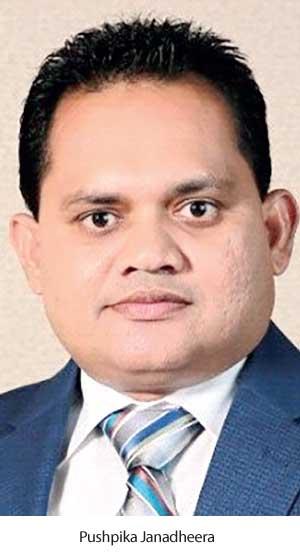20 Feb 2023 - {{hitsCtrl.values.hits}}

After over two years of product development, Dipped Product PLC plans to launch its dedicated LEED certified manufacturing facility for sports gloves in Biyagama Export Processing Zone this April with an over Rs.1 billion investment.
“Our main facility for mass production (of sports glove) will be opened in April this year. Initially, we are focusing on the development side, because this is a product that has to move along with the reputed brands. We are currently discussing and looking at their requirements and see how we can cater to their demands,” Dipped Product PLC (DPL) Managing Director, Pushpika Janadheera said.
The company commenced R&D and market research activities into sports glove segment 2-3 years ago and it officially launched the sports glove segment in the last financial year (FY).
DPL is a global leader in protective hand-wear, serving close to 5 percent of global demand for natural and synthetic-latex based household and industrial gloves.
The new facility is built in a 2-acre land block in the Biyagama Export Processing Zone.
Sports glove segment is considered to be a niche in the overall hand protection market with the ability to command higher margins due to their different specialties associated with the glove types required in each sport. DPL has developed broad product line ranging from American Football to Cycling to Yoga to Horseback Riding.
According to Janadheera, United States and Europe would be the key markets for DPL in this new segment.
He pointed out that DPL’s existing technologies would be an added advantage for the company to make inroads into this segment.
“One of the advantages we have in this arena is our technology in industrial glove segment. Some of technologies in industrial glove segment can be used in sports glove segment, including certain dipping functions,” he added.
DPL has a vast product range comprising over 350 products of natural and synthetic-latex based supported, unsupported and disposable gloves with numerous applications which are exported to over 70 countries. In 2021/2022 FY, the company leveraged its R&D capabilities to introduce record 20 new products which included 6 supported gloves and 3 unsupported gloves and 11 in medical glove range while expanding its value-added product portfolio which included widening the product range in electrical gloves.
The company has four manufacturing facilities in Sri Lanka, one manufacturing facility in Thailand and marketing and distribution arm in Italy.
Currently, Europe remains DPL’’s main market for hand gloves with 66.22 percent share followed by North America and South America.
Moving ahead, Janadheera shared that the company plans to increase its distribution arms in Europe, India and Middle East. In April last year, DPL set up a distribution arm in France which is expected to drive customer acquisition and volume growth in the medium-to-long term.
Incorporating sustainable design and packaging to its product development process also remains a key priority for DPL. The company recently introduced recycled packaging material for selected products.
In addition, in last FY, the company launched over 150 projects to reduce waste, optimise resource consumption and increase efficiency, which resulted in cost savings to the tune of Rs. 300 million. Dipped Products’ parent company Hayleys Group, has an ambitious target of reducing carbon emission by 30 percent by 2030.
During the first nine months of the current FY, the company reported 44 percent YoY increase in sales to Rs.61.5 billion, while profits more than doubled to Rs.7 billion in the period.
23 Nov 2024 1 hours ago
23 Nov 2024 1 hours ago
23 Nov 2024 3 hours ago
23 Nov 2024 4 hours ago
23 Nov 2024 6 hours ago